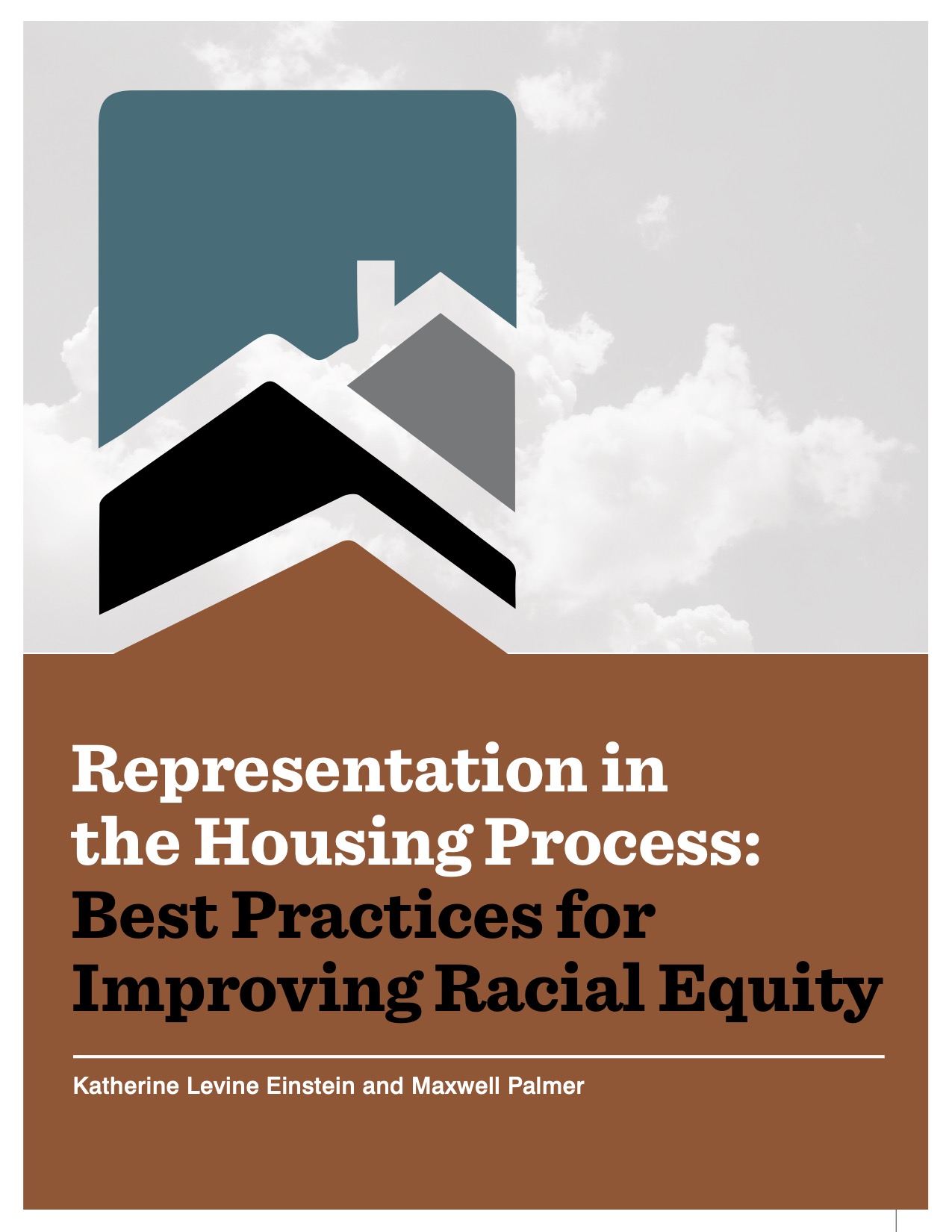New report connects of lack of diversity in process to state’s affordable housing failures
Report highlights demographic differences between public officials and residents, and power of connecting with underrepresented voices
June 15, 2022
Boston – The process for approving new housing development in communities across Massachusetts is skewed toward an older, white population with the greatest interest in obstructing new development, but simple steps could reset the balance to better reflect communities, according to a new report from Boston University researchers.
In the report Representation in the Housing Process: Best Practices for Improving Racial Equity, researchers Katherine Levine Einstein and Maxwell Palmer highlight five recommendations for improving equity in representation on housing issues.
“This report both vividly illustrates how the housing process in cities and towns favors established residents with the time and means to be able to track town board schedules and attend in-person meetings,” said M. Lee Pelton, President and CEO of the Boston Foundation, which co-sponsored the report with the Citizens’ Housing and Planning Association (CHAPA), Boston Medical Center and others as part of the Massachusetts Coalition for Racial Equity in Housing. “As a result, the bias toward older, existing homeowners effectively excludes a broad range of people from accessing housing in the communities of their choice and perpetuates housing segregation.”
The researchers suggest the housing process as it stands reflects a system that lacks diversity and representation across multiple dimensions, including:
- A lack of diversity on housing-related boards and commissions
- Representational inequalities in political participation and public meetings
- Processes that favor neighborhood opponents to new development over beneficiaries
- Meeting and survey formats that don’t tap into the broadest range of voices
- A lack of investment in time and resources to ensure surveys and other information reflect the full range of community feedback.
“Addressing the housing crisis requires recognizing and addressing deep inequalities in the housing production process. Unrepresentative and privileged voices currently dominate the process, and make it extraordinarily difficult to build much-needed housing,” said Katherine Levine Einstein and Maxwell Palmer, Associate Professors at Boston University and fellows at the B.U. Institute on Cities. “But we can reform our housing processes by acknowledging these inequities and reorienting housing production around representation and inclusive engagement – resulting in more effective housing policies that better serve communities.”
“At Boston Medical Center (BMC), we see the direct connection between our patients’ health and safe, affordable housing,” said Thea James, MD, the Vice President of Mission and Associate Chief Medical Officer at BMC. “Structural bias throughout the system often determines who has access to housing and who doesn’t. Housing is critical to achieving health equity, and we must include the voices that have been excluded from this process.”
The researchers compared the demographics of public officials in more than 20 cities, including Boston, Cambridge, and nearly a dozen “Gateway Cities” in Massachusetts, with the demographics of the residents of those communities. They found that the public officials were significantly older, whiter, more male, and more likely to be longtime residents than the voters in their communities.
Past research shows that these representational disparities mirror similar differences (by race, age, homeownership, and sex) in who participates in public meetings on housing development.
Case studies demonstrate impact
Closing this representation gap through more inclusive engagement can take many forms. Still, it needs to be more involved than simply changing meeting times or offering childcare to make participation easier. While these efforts might result in small improvements to participation, successful communities have recognized a need to meet residents where they already gather, and to work to build trust and understanding in underrepresented groups.
The researchers highlight examples of these efforts in the report. In Haverhill, city leaders built engagement by traveling to Spanish language mass at a local church to gather local input on a development. And in Newton, the Department of Planning and Development and community engagement officials have used a multi-pronged approach to reach a broader array of residents.
One powerful tool proved to be the use of equitable focus groups to get beyond the unrepresentative sample of meeting attendees – to connect with BIPOC and LGBTQ+ people, people with disabilities, young people, renters, and others whose voices are infrequently heard in planning discussions. The differences in opinions were stark and notable. Whereas only about 11% of comments at a December 2020 public meeting endorsed greater housing density, support among those in the focus groups was over 70% in favor. Even among elderly residents in the focus groups, support was roughly four times higher than in the public meeting.
The researchers note that truly expanding the range of voices on critical issues can be costly and time-consuming – lower-cost efforts such as surveys often result in “convenience samples” that still bias results toward older, white, and homeowning residents. They can also be politically challenging for city officials. But the results can be well worth it.
“To ensure a bright future for everyone in the Commonwealth, we need to include all voices. Our current systems impose barriers that many of us can’t see. This report shows us that reaching out to people in their neighborhoods and at community events adds a tremendous benefit to local decision-making," said Rachel Heller, Chief Executive Officer at CHAPA. "Increasing diversity on local boards and commissions will help our cities and towns thrive. Our neighbors have a lot to say about the future of our communities. It’s up to us to listen.”

